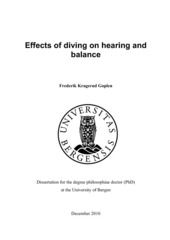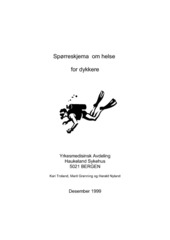| dc.contributor.author | Goplen, Frederik Kragerud | en_US |
| dc.date.accessioned | 2011-07-18T08:16:47Z | |
| dc.date.available | 2011-07-18T08:16:47Z | |
| dc.date.issued | 2011-06-10 | eng |
| dc.identifier.isbn | 978-82-308-1738-4 (print version) | en_US |
| dc.identifier.uri | https://hdl.handle.net/1956/4841 | |
| dc.description.abstract | Diving has profound effects on the human body including the inner ear, which contains the organs of hearing and balance. Ear injury is the most common medical problem in diving. The aim of this work was to explore the short and long-term effects of diving on hearing and balance through a simulated deep saturation dive and two epidemiological studies on commercial divers. The first study explored short-term effects of absolute pressure on the body. The high-pressure neurological syndrome (HPNS) occurs at pressures exceeding 150 msw. The symptoms include tremors, decreased psychomotor performance, dizziness, nausea and drowsiness, and there is a tendency for adaptation, since many of the symptoms disappear quickly when pressure is held constant. In this study we measured postural stability in a simulated saturation dive in helium-oxygen to 240 msw, which lasted for 19 days. Eight subjects participated. Postural balance was measured 152 times during the dive by means of a force platform (static posturography). In spite of a long compression phase (>20 h) including three stops for adaptation, postural instability was observed throughout the bottom phase. There was no significant adaptation, but balance normalized during the decompression. Postural instability therefore seems to be related not only to compression rate, but also to absolute pressure. This could indicate that posturography is more sensitive than other methods in detecting HPNS. The second study included 230 offshore divers who had been working on the Norwegian continental shelf before 1990. Most of them had retired from diving. The main finding was that these divers had more vestibular symptoms, such as dizziness, vertigo and disequilibrium than age-matched controls, and that they also had more postural instability as measured by static posturography. The finding is important, since these symptoms often lead to decreased quality of life. The symptoms were strongly associated with a previous history of decompression sickness, which is one of the major causes of morbidity in professional divers. The third study included 67 young subjects attending a basic course for professional divers. They were examined at the course, after three and six years. Transient dizziness or vertigo was a common experience while diving, and the possible causes are discussed in this thesis. We found no long-term effects of frequent diving per se on balance or subjective disequilibrium. There were no cases of inner ear barotrauma or inner ear decompression sickness during follow-up. However, there was a progressive deterioration of hearing thresholds at 4 kHz, a frequency commonly affected by noise. There was also an increase in the prevalence of subjective hearing difficulties. Both were associated with occupational noise exposure, but not significantly with the amount of diving. We therefore concluded that noise was the most important cause of hearing loss in this diver group. Summing up the results from the three studies, long-term effects were found on both hearing and balance, which were associated with noise and decompression sickness respectively. No long-term effects were found in association with frequent diving per se, however transient postural instability appears to be a feature of deep diving, and was found to last through the bottom phase even after a slow compression. | en_US |
| dc.language.iso | eng | eng |
| dc.publisher | The University of Bergen | eng |
| dc.relation.haspart | Paper I: Undersea and Hyperbaric Medicine 34(2), Goplen, F. K.; Aasen, T.; Nordahl, S. H., Postural control in a simulated saturation dive to 240 msw, pp. 123-130. Copyright 2007 Undersea and Hyperbaric Medical Society. Reproduced with permission from the Undersea and Hyperbaric Medical Society. Published version. | en_US |
| dc.relation.haspart | Paper II: Aviation Space and Environmental Medicine 78(4), Goplen, F. K.; Grønning, M.; Irgens, Å, Sundal, E.; Nordahl, S. H., Vestibular symptoms and otoneurological findings in retired offshore divers, pp. 414-419. Copyright Aerospace Medical Association. Full text not available in BORA due to publisher restrictions. | en_US |
| dc.relation.haspart | Paper III: Occupational Medicine 60(1), Goplen, F. K.; Grønning, M.; Aasen, N.; Nordahl, S. H., Vestibular effects of diving—a 6-year prospective study, pp. 43-48. Copyright The Author 2009. Published by Oxford University Press on behalf of the Society of Occupational Medicine. Full text not available in BORA due to publisher restrictions. The published version is available at: <a href="http://dx.doi.org/10.1093/occmed/kqp148" target="_blank"> http://dx.doi.org/10.1093/occmed/kqp148</a> | en_US |
| dc.relation.haspart | Paper IV: European Archives of Oto-Rhino-Laryngology 268(7), Goplen, F. K.; Aasen, T.; Grønning, M.; Molvær, O. I.; Nordahl, S. H., Hearing loss in divers: a six-year prospective study, pp. 979-985. Copyright 2011 Springer-Verlag. Reproduced with permission. Accepted version. The published version is available at: <a href="http://dx.doi.org/10.1007/s00405-011-1486-1" target="_blank">http://dx.doi.org/10.1007/s00405-011-1486-1</a> | en_US |
| dc.title | Effects of diving on hearing and balance | en_US |
| dc.type | Doctoral thesis | |
| dc.rights.holder | Copyright the author. All rights reserved | |
| dc.rights.holder | The author | |
| dc.subject.nsi | VDP::Medical disciplines: 700::Clinical medical disciplines: 750::Otolaryngology: 755 | eng |



